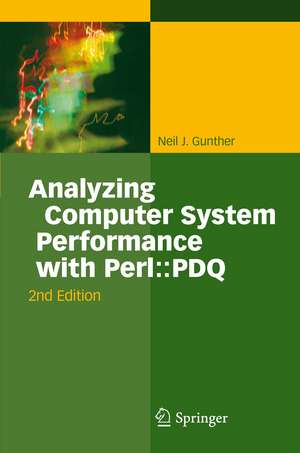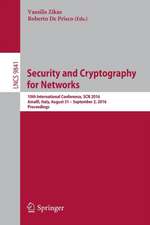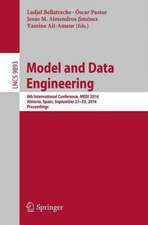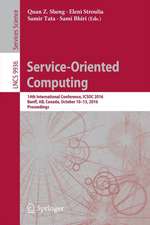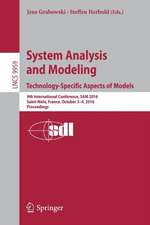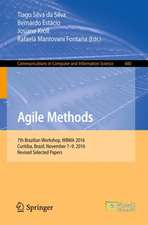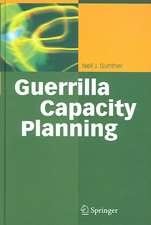Analyzing Computer System Performance with Perl::PDQ
Autor Neil J. Guntheren Limba Engleză Paperback – 28 noi 2014
Building on the success of the first edition, this considerably expanded second edition now comprises four parts. Part I contains the foundational concepts, as well as a new first chapter that explains the central role of queues in successful performance analysis. Part II provides the basics of queueing theory in a highly intelligible style for the non-mathematician; little more than high-school algebra being required. Part III presents many practical examples of how PDQ can be applied. The PDQ manual has been relegated to an appendix in Part IV, along with solutions to the exercises contained in each chapter.
Throughout, the Perl code listings have been newly formatted to improve readability. The PDQ code and updates to the PDQ manual are available from the author's web site at www.perfdynamics.com
| Toate formatele și edițiile | Preț | Express |
|---|---|---|
| Paperback (1) | 342.65 lei 43-57 zile | |
| Springer Berlin, Heidelberg – 28 noi 2014 | 342.65 lei 43-57 zile | |
| Hardback (1) | 346.90 lei 43-57 zile | |
| Springer Berlin, Heidelberg – 30 iul 2011 | 346.90 lei 43-57 zile |
Preț: 342.65 lei
Preț vechi: 428.31 lei
-20% Nou
Puncte Express: 514
Preț estimativ în valută:
65.59€ • 71.27$ • 55.13£
65.59€ • 71.27$ • 55.13£
Carte tipărită la comandă
Livrare economică 21 aprilie-05 mai
Preluare comenzi: 021 569.72.76
Specificații
ISBN-13: 9783642437137
ISBN-10: 3642437133
Pagini: 504
Ilustrații: XXVIII, 474 p.
Dimensiuni: 155 x 235 x 33 mm
Greutate: 0.7 kg
Ediția:2nd ed. 2011
Editura: Springer Berlin, Heidelberg
Colecția Springer
Locul publicării:Berlin, Heidelberg, Germany
ISBN-10: 3642437133
Pagini: 504
Ilustrații: XXVIII, 474 p.
Dimensiuni: 155 x 235 x 33 mm
Greutate: 0.7 kg
Ediția:2nd ed. 2011
Editura: Springer Berlin, Heidelberg
Colecția Springer
Locul publicării:Berlin, Heidelberg, Germany
Public țintă
Professional/practitionerCuprins
Part I Preliminary Concepts.- Why Queues Rule Performance Analysis.- Measurement Tools and Techniques.- Time - The Zeroth Performance Metric.- Part II Basic Queueing Theory for PDQ.- Getting the Jump on Queueing.- Queueing Systems for Computer Systems.- Linux Load Average.- Performance Bounds and Log Jams.- Part III Practical Application of PDQ.- Pretty Damn Quick|A Slow Introduction.- Multicomputer Analysis with PDQ.- How to Scale an Elephant with PDQ.- Client/Server Analysis with PDQ.- Web Application Analysis with PDQ.- Virtual Machine Analysis with PDQ.- Part IV Appendices.- Thanks for No Memories.- Compendium of Queueing Equations.- Units and Abbreviations.- Perl PDQ Manual.- Solutions to Selected Exercises.
Recenzii
From the reviews
"The literature of computer performance analysis is generally composed of two groups: heavy theoretical treatises and performance cookbooks. […] Surprisingly, this book is exceptionally well balanced between theory and practice […] . I strongly recommend this book, both for the novice practitioner and for the experienced performance analyst. Both can extract a vast array of benefits, ranging from understanding the theoretical concepts of performance modeling, to building for themselves a powerful modeling tool […] ." Jair Merlo, Computing Reviews, May 2005
From the reviews of the second edition:
“Besides its case studies on applying queueing theory to the analysis of computer performance, this book on queueing circuits also includes a quick user guide to Perl Pretty Damn Quick (PDQ), a reference manual, and numerous examples. … The book is written to be a field manual for enlightened practitioners of performance analysis, or possibly a school textbook. … It is a laudable achievement to make performance analysis theoretical foundations available to anyone who is interested and can master high-school algebra.” (A. Squassabia, ACM Computing Reviews, December, 2011)
"The literature of computer performance analysis is generally composed of two groups: heavy theoretical treatises and performance cookbooks. […] Surprisingly, this book is exceptionally well balanced between theory and practice […] . I strongly recommend this book, both for the novice practitioner and for the experienced performance analyst. Both can extract a vast array of benefits, ranging from understanding the theoretical concepts of performance modeling, to building for themselves a powerful modeling tool […] ." Jair Merlo, Computing Reviews, May 2005
From the reviews of the second edition:
“Besides its case studies on applying queueing theory to the analysis of computer performance, this book on queueing circuits also includes a quick user guide to Perl Pretty Damn Quick (PDQ), a reference manual, and numerous examples. … The book is written to be a field manual for enlightened practitioners of performance analysis, or possibly a school textbook. … It is a laudable achievement to make performance analysis theoretical foundations available to anyone who is interested and can master high-school algebra.” (A. Squassabia, ACM Computing Reviews, December, 2011)
Notă biografică
Neil Gunther, M.Sc., Ph.D. is an internationally recognized computer performance researcher who founded Performance Dynamics Company (www.perfdynamics.com) in 1994, after having held both university teaching positions and management positions at Xerox PARC and Pyramid-Siemens Technology. In 2008 Dr. Gunther received the prestigious A.A. Michelson Award from CMG. In 2009, he was elected Senior Member of both the ACM and IEEE. Read more about him at en.wikipedia.org/wiki/Neil_J._Gunther.
Textul de pe ultima copertă
To solve performance problems in modern computing infrastructures, often comprising thousands of servers running hundreds of applications, spanning multiple tiers, you need tools that go beyond mere reporting. You need tools that enable performance analysis of application workflow across the entire enterprise. That's what PDQ (Pretty Damn Quick) provides. PDQ is an open-source performance analyzer based on the paradigm of queues. Queues are ubiquitous in every computing environment as buffers, and since any application architecture can be represented as a circuit of queueing delays, PDQ is a natural fit for analyzing system performance.
Building on the success of the first edition, this considerably expanded second edition now comprises four parts. Part I contains the foundational concepts, as well as a new first chapter that explains the central role of queues in successful performance analysis. Part II provides the basics of queueing theory in a highly intelligible style for the non-mathematician; little more than high-school algebra being required. Part III presents many practical examples of how PDQ can be applied. The PDQ manual has been relegated to an appendix in Part IV, along with solutions to the exercises contained in each chapter.
Throughout, the Perl code listings have been newly formatted to improve readability. The PDQ code and updates to the PDQ manual are available from the author's web site at www.perfdynamics.com
Building on the success of the first edition, this considerably expanded second edition now comprises four parts. Part I contains the foundational concepts, as well as a new first chapter that explains the central role of queues in successful performance analysis. Part II provides the basics of queueing theory in a highly intelligible style for the non-mathematician; little more than high-school algebra being required. Part III presents many practical examples of how PDQ can be applied. The PDQ manual has been relegated to an appendix in Part IV, along with solutions to the exercises contained in each chapter.
Throughout, the Perl code listings have been newly formatted to improve readability. The PDQ code and updates to the PDQ manual are available from the author's web site at www.perfdynamics.com
Caracteristici
New chapters on queues, tools and virtualization New Perl listing format to aid readability of PDQ models Fully compatible with latest PDQ 5.0 software release Crowd-sourced corrigenda to first edition has been included Includes supplementary material: sn.pub/extras
